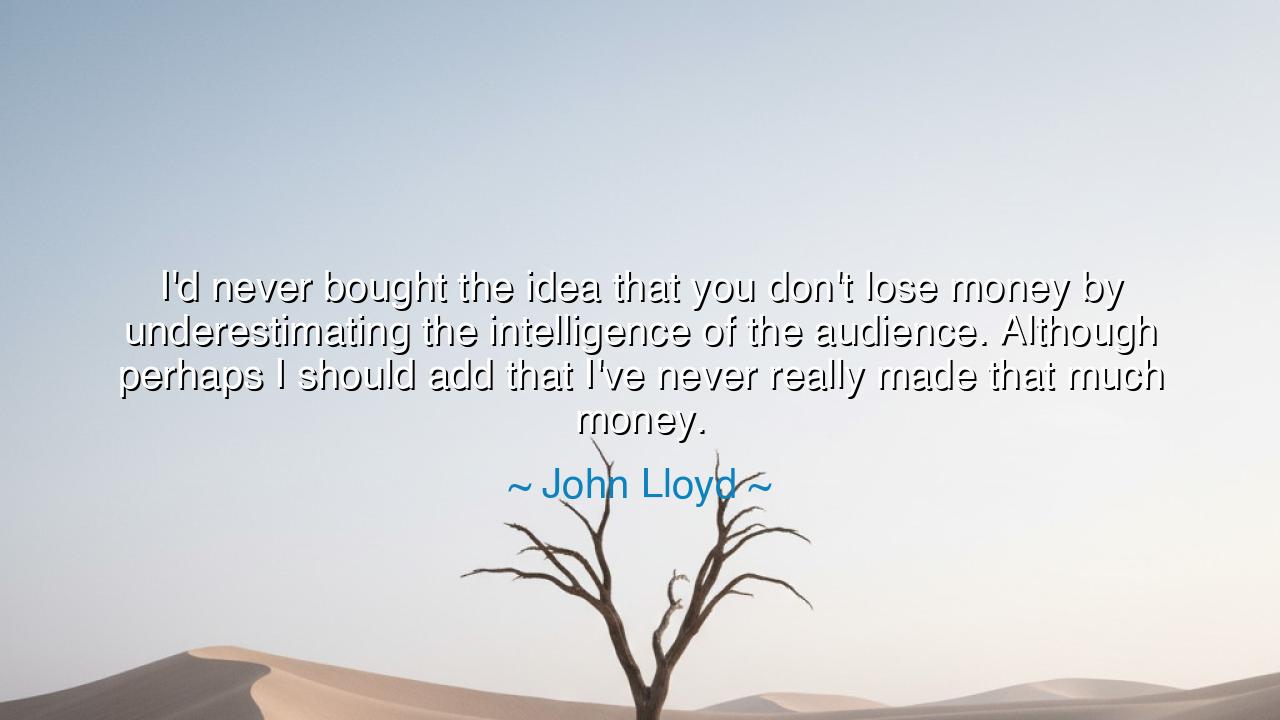
I'd never bought the idea that you don't lose money by
I'd never bought the idea that you don't lose money by underestimating the intelligence of the audience. Although perhaps I should add that I've never really made that much money.






The words of John Lloyd, like a quiet flame in a darkened hall, speak of a man who cherished intellect over profit, truth over applause, and depth over convenience. He says, “I’d never bought the idea that you don’t lose money by underestimating the intelligence of the audience. Although perhaps I should add that I’ve never really made that much money.” Behind these words lies both humor and lament — the bittersweet confession of a creator who refused to trade integrity for ease. His voice, half in jest, half in sorrow, reminds us that wisdom often walks a poorer road than flattery, and that the pursuit of truth is rarely the path to riches.
In the modern world, there arose a saying that to prosper, one must appeal to the lowest common mind — that simplicity sells, and that the masses cannot bear the weight of thought. Many merchants, politicians, and entertainers have built empires upon this creed, shaping their craft not to enlighten, but to soothe; not to elevate, but to entertain. Yet Lloyd — creator of the thought-provoking and the absurd, from Blackadder to QI — stood apart. He did not “buy” the idea that ignorance is profitable, for his heart could not bear deceit. He believed that the audience is intelligent, and that honor lies in challenging rather than pacifying. His jest that he “never made much money” is the sigh of the philosopher, the artist who finds wealth only in the soul.
From the depths of time, such voices have always existed — men and women who refused to speak to the crowd in the language of flattery. Think of Socrates, who walked the streets of Athens questioning, provoking, stirring the minds of his people. He could have spoken sweetly and lived long, but he chose to speak truth and drink hemlock instead. The city rewarded his wisdom with death, just as modern audiences may reward honest art with silence. Yet from his sacrifice rose the eternal flame of philosophy, proving that the fruits of integrity, though slow to ripen, endure when the harvests of deceit have rotted away.
So too did Galileo, standing before his inquisitors, choose honesty over comfort. He could have spoken what the rulers wished to hear — that the earth stood still and the heavens revolved around it — and thus retained his peace. But truth burned too fiercely within him. Like Lloyd’s refusal to underestimate his audience, Galileo refused to underestimate humanity’s capacity for understanding. Both men believed that reason, though scorned for a season, would triumph in time. Their lives remind us that one must sometimes lose wealth, favor, or even freedom, to keep the treasure of one’s own integrity.
The world has always tempted its creators with an easy bargain: “Speak what they wish to hear, and you shall be rewarded.” But those who heed that siren’s song find that the applause fades quickly, and the soul grows quiet in its shame. Better, says Lloyd in his dry wisdom, to earn little and speak true, than to gain much and lose oneself. For to underestimate the intelligence of others is also to insult one’s own spirit, admitting that one’s words cannot lift, only please. The noble heart must strive not for comfort, but for the awakening of others, however small the audience, however slow the reward.
Thus the lesson is this: Do not measure your worth by the gold you earn, but by the truth you keep. If your craft, your speech, or your work challenges minds and stirs hearts, you have not failed — even if the marketplace says you have. Integrity is the coin of eternity, and it spends far more richly than silver or fame. Like the ancients, let your words be crafted for meaning, not for market; let your art be a mirror to the higher self, not a toy for idle minds.
And in your daily life, take heed: when you speak, speak with respect for the mind that listens. When you teach, teach with faith in your pupil’s wisdom. When you create, create not for the crowd, but for the truth that moves through you. For though the world may not always pay the thinker in coin, it pays him in legacy — and his words, once sown in sincerity, will outlive every fortune built upon deceit.






AAdministratorAdministrator
Welcome, honored guests. Please leave a comment, we will respond soon